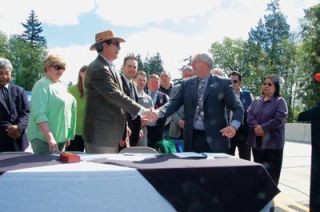TULALIP A sea-change in relations between the Tulalip Tribes and the city of Marysville was cemented this week with the opening of a new $6 million road on the reservation and the signing of a government alliance pledging increased cooperation between the two neighbors.
A concrete example was a new connecting road that will siphon off much of the traffic clogging 116th Street NE both on the Tulalip Indian Reservation and in the city. Members of the Tribes Board of Directors and the Marysville City Council symbolically cut-the-ribbon on the new Quil Ceda Boulevard extension, but they were really binding themselves together.
Not so recently the two entities were at odds over utility connections and traffic concerns, and city officials envied the Tribes recent success with commercial projects while builders platted only residences in Marysville.
Now leaders promise continued cooperation with transportation infrastructure, education and anything else that will come their way as north Snohomish County becomes a magnet for exploding retail, commercial, industrial, hospitality and gaming activity on both sides of I-5. Marysville will be attracting large-scale manufacturing and light industry to the 800-acre former NASCAR site while the Tribes top-off their 12-story hotel just in time for the 2010 Olympics in Vancouver, British Columbia.
Youre right Mel, were not going anywhere, Marysville Mayor Dennis Kendall told newly-elected Tribal Chairman Mel Sheldon Jr. at the May 7 ribbon-cutting that attracted about 100 people to the new bridge over the West Fork of Quilceda Creek. The bridge and a new round-a-bout at the intersection of 34th Avenue NE will help route the traffic clogging roads in the area. While Kendall raved about the condition of the new bridge and asphalt, Sheldon and other tribal leaders cited improvements made to 116th Street NE by the city. Marysville borrowed money to complete improvements to the south side of the street fronting the new Kohls department store at the same time developer White-Leasure of Idaho was doing the north. Thats important because the Tulalips own a wedge of land on the Marysville side of the freeway and plan to build a transit center there, using the old railroad bridge to bring people to Quil Ceda Village and the new Tulalip Resort Casino.
Its really neat how the relationship is working now, said Marysville city councilman Jon Nehring.
Former Tribal chairman and current board director Stan Jones Jr. noted that the road extension was six years in the making before saying a solemn prayer in Lushootseed, the Tulalip tongue. Tribal leaders Sheldon and vice-chairwoman Marie Zackuse presented Kendall with a blanket, a token of great respect to the Tribes, and he gave them a gift in return.
If the Indians regretted some of the past treaties signed with the government, you couldnt tell as their leaders cited the many goals the Tribes and Marysville will work together to achieve. Quil Ceda Village deputy general manager Steve Gobin outlined the future projects on the plate, stressing that the improvements to 116th Street on both sides of I-5 were just a beginning.
The compact signed Monday binds both agencies to cooperate on several future phases of road improvements, up to and including working to fund an freeway interchange near 156th Street NE that is estimated to cost $50 million and would require federal funds. Other areas include heath, the environment, and economic development. Better social and cultural understanding will result as well, according to Gobin, who noted similar cooperation with the Marysville School District.
Tribes, city sign alliance to work together
TULALIP A sea-change in relations between the Tulalip Tribes and the city of Marysville was cemented this week with the opening of a new $6 million road on the reservation and the signing of a government alliance pledging increased cooperation between the two neighbors.



